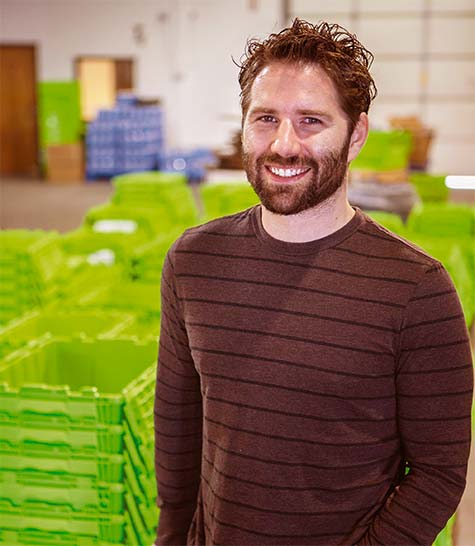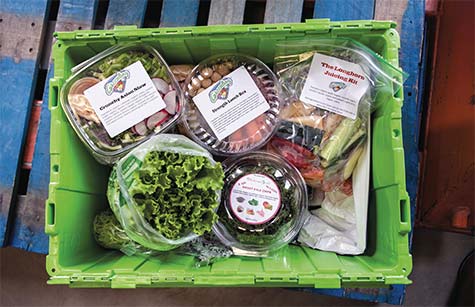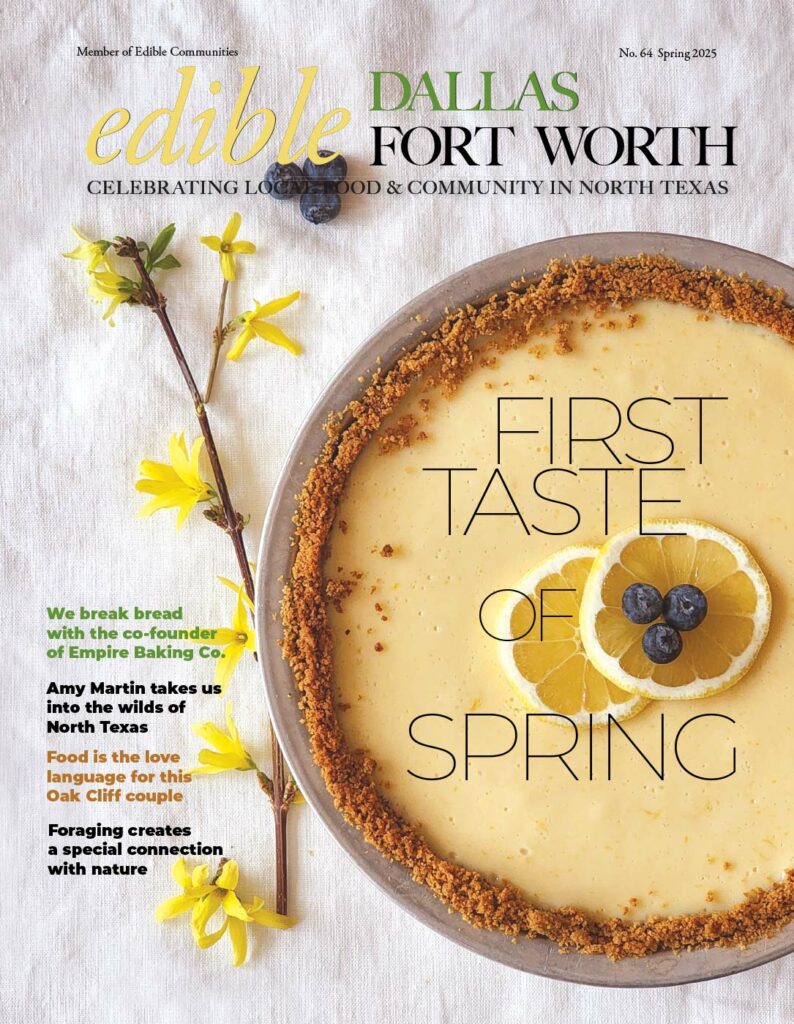
Sesame Street’s affable blue character has a
voracious appetite, not just for cookies, but
also for a rainbow of healthy foods.
Photography by Kelly Yandell
Cookie Monster is an odd job title for the CEO of a company that specializes in organic and local foods. But for Mason Arnold, the innovator behind Greenling, a farm-to-home delivery service, it makes perfect sense. After all, Sesame Street’s affable blue character has a voracious appetite, not only for cookies, but also for a rainbow of healthy foods.
Greenling was designed to give city consumers online access to local farms, ranches and small-batch food producers. Founded by Arnold in 2005, the company began in Austin and then expanded to San Antonio, Dallas, Fort Worth and Houston. Customers choose from a seasonal list of local and/or organic produce, meats, dairy and artisanal foods. Items may be chosen a la carte or in a pre-selected box filled with the week’s best picks. Also available are prepared meal kits geared to dietary preferences. There are kits for juicing, kits that comply with popular diets and kits geared to those with allergies and food sensitivity concerns.
Thanks to his father’s prolific garden and his mother’s nursing background, Arnold was introduced to healthy foods at an early age.
He fondly describes his parents as reformed hippies. “My dad was growing organically since before organic was a word,” he says. He remembers his father’s love of okra and how he was one of the few people growing Longhorn okra at the time. His father also had a knack for growing big, delicious peaches. But the young Arnold didn’t completely embrace his parents’ ways of thinking. “I always had the fresh food growing up, and I didn’t really appreciate it.”
The idea for Greenling came to him after several unsatisfying professional incarnations. With a background in chemical engineering, he began his working life filing permits with the Commission for Texas Environmental Quality on behalf of a chemical company. It didn’t take long until the processes involved disaffected him. After only six months, he declared, “I can’t be a part of it” and in a breath was reborn as an entrepreneur bent on doing something that was both a positive force for the environment and financially viable.

Arnold’s first enterprise was a landscape company, but within a short period of time, he developed a philosophical conflict with conventional lawns. He was dismayed by the quantity of water and the toxic fertilizers and herbicides that traditional yards demanded. With these thoughts in mind, he turned his focus to the emerging interest in sustainably grown, local foods. Given the incredible amount of water consumed by agriculture and the large amounts of energy needed to transport food, he decided: “If we fix the food issue, it dramatically solves the other problems.”
Arnold and the company’s procurers scour the countryside and farmers markets to determine which farmers and food businesses are bringing the best foods to local markets. “Traditional produce travels 1,800 miles on average to get the grocery stores,” says Arnold. “Local produce travels 75 miles on average.” When the company expanded to Dallas and Fort Worth in 2012, Arnold tapped the experience of Orly Cohen, a former employee of the Dallas Farmers Market, to help establish their list of local producers.
The company honed in on growers using organic and sustainable methods. According to Arnold, research suggests that organically grown food uses 30 to 50% less water because healthy soil holds water better, guarding against drought and helping with flood control.
“We don’t require local farmers to be certified. We vet every vendor we work with, and we do research and rely on organic certification for those farther away,” he explained. “Our responsibility is to do the curation. We want people to trust us to make these choices for them.”
While farmers can make more money by selling directly to consumers at farmers markets, not all of them have the time for that commitment. “We are building long term relationships with our food producers,” says Arnold. “Fifty to seventy-five percent of the total cost charged to the customer goes to the farmer or producer.” Greenling doesn’t charge back to the vendors for unsold items. Unless there is something inherently wrong with an item, Greenling takes responsibility for the losses.
“Our non-retail product loss is 2% and none goes into the trash,” says Arnold. The company accomplishes this by having an efficient supply chain and only purchasing as much as is needed to fill orders. A conventional grocery store, according to Arnold, can have loss rates of up to 30%, much of which goes directly into the trash. Greenling has relationships with composters, who are more than happy to put any unused produce to good use.
Arnold is constantly analyzing processes and efficiencies to decrease the environmental impact of deliveries. Greenling’s white and lime, signature trucks are critical to this math. “They get 25 miles per gallon on the road, fully loaded and with the refrigeration running,” he says. “They are the most fuel-efficient trucks currently available.” Looking to the future, Arnold sees the potential to continue rolling out this model to more communities. Progressive in his environmental goals and management policies, he has come full circle, combining the holistic lessons from his father’s garden with the analytical processes he learned as an engineer. The result is a user-friendly link, connecting cosmopolitan consumers to the quality food producers of their region.
KELLY YANDELL is a writer and photographer based in Dallas. She has contributed to Edible Dallas & Fort Worth since 2011. Her website (themeaningofpie.com) celebrates practical dishes and comfort foods, while her photography portfolio can be found at kellyyandell.com. Kelly is an attorney and is the vice president of the Advisory Board of Foodways Texas, an organization founded by scholars, chefs, journalists, restaurateurs, farmers, ranchers, and other citizens of the state of Texas who have made it their mission to preserve, promote and celebrate the diverse food cultures of Texas.
- Kelly Yandellhttps://www.edibledfw.com/author/kyandell/
- Kelly Yandellhttps://www.edibledfw.com/author/kyandell/
- Kelly Yandellhttps://www.edibledfw.com/author/kyandell/
- Kelly Yandellhttps://www.edibledfw.com/author/kyandell/









